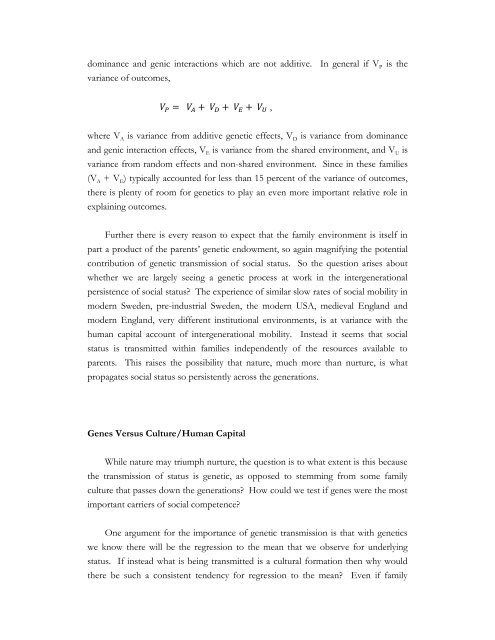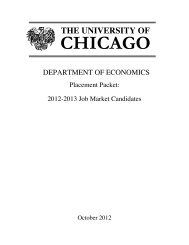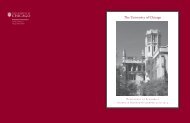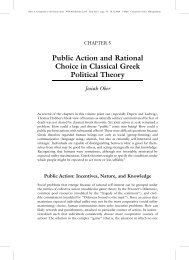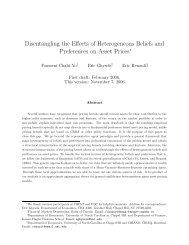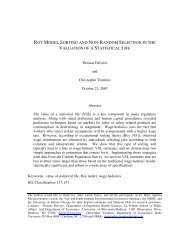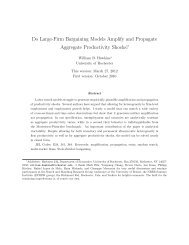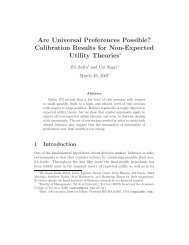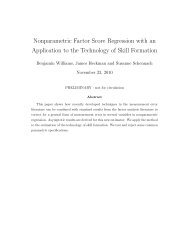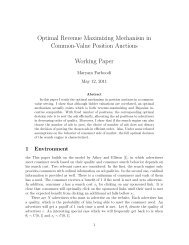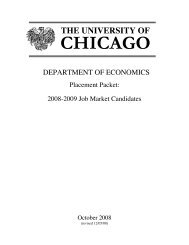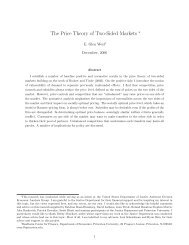Surnames and a Theory of Social Mobility - University of Chicago ...
Surnames and a Theory of Social Mobility - University of Chicago ...
Surnames and a Theory of Social Mobility - University of Chicago ...
Create successful ePaper yourself
Turn your PDF publications into a flip-book with our unique Google optimized e-Paper software.
dominance <strong>and</strong> genic interactions which are not additive. In general if V P is the<br />
variance <strong>of</strong> outcomes,<br />
,<br />
where V A is variance from additive genetic effects, V D is variance from dominance<br />
<strong>and</strong> genic interaction effects, V E is variance from the shared environment, <strong>and</strong> V U is<br />
variance from r<strong>and</strong>om effects <strong>and</strong> non-shared environment. Since in these families<br />
(V A + V E ) typically accounted for less than 15 percent <strong>of</strong> the variance <strong>of</strong> outcomes,<br />
there is plenty <strong>of</strong> room for genetics to play an even more important relative role in<br />
explaining outcomes.<br />
Further there is every reason to expect that the family environment is itself in<br />
part a product <strong>of</strong> the parents’ genetic endowment, so again magnifying the potential<br />
contribution <strong>of</strong> genetic transmission <strong>of</strong> social status. So the question arises about<br />
whether we are largely seeing a genetic process at work in the intergenerational<br />
persistence <strong>of</strong> social status The experience <strong>of</strong> similar slow rates <strong>of</strong> social mobility in<br />
modern Sweden, pre-industrial Sweden, the modern USA, medieval Engl<strong>and</strong> <strong>and</strong><br />
modern Engl<strong>and</strong>, very different institutional environments, is at variance with the<br />
human capital account <strong>of</strong> intergenerational mobility. Instead it seems that social<br />
status is transmitted within families independently <strong>of</strong> the resources available to<br />
parents. This raises the possibility that nature, much more than nurture, is what<br />
propagates social status so persistently across the generations.<br />
Genes Versus Culture/Human Capital<br />
While nature may triumph nurture, the question is to what extent is this because<br />
the transmission <strong>of</strong> status is genetic, as opposed to stemming from some family<br />
culture that passes down the generations How could we test if genes were the most<br />
important carriers <strong>of</strong> social competence<br />
One argument for the importance <strong>of</strong> genetic transmission is that with genetics<br />
we know there will be the regression to the mean that we observe for underlying<br />
status. If instead what is being transmitted is a cultural formation then why would<br />
there be such a consistent tendency for regression to the mean Even if family


